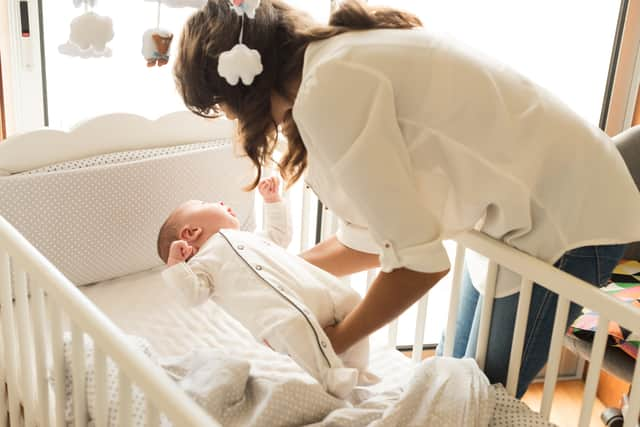Sudden infant death syndrome: parents warned to keep baby’s sleep area ‘bare’ to prevent death in new guidance
and live on Freeview channel 276
Parents are being urged to keep their baby’s sleep area “bare” to help reduce the risk of Sudden infant death syndrome (SIDS).
New guidance advises parents to keep loose items, such as teddies and blankets, away from babies at night and to avoid co-sleeping.
Advertisement
Hide AdAdvertisement
Hide AdAround 200 babies die from SIDS in the UK every year, although rates have remained steady since a safe sleeping campaign launched in the 1990s.


What is SIDS?
SIDS, also sometimes known as "cot death", is the sudden, unexpected and unexplained death of an apparently healthy baby.
Most deaths occur during the first six months of a baby’s life, according to the NHS, with infants born prematurely or with a low birthweight at greater risk. The syndrome also tends to be slightly more common among baby boys.
What causes SIDS?
The exact cause of SIDS is unknown, but it is thought to be down to a combination of factors.
Advertisement
Hide AdAdvertisement
Hide AdHealth experts believe it occurs at a particular stage in a baby’s development and that babies vulnerable to certain environmental stresses are affected.
This vulnerability is thought to be caused by premature birth, or having a low birthweight, but other environmental factors could also have an effect, such as tobacco smoke, getting tangled in bedding, a breathing obstruction or minor illness.
Parents sleeping with their baby on a bed, sofa or chair has also been linked to an increased risk of SIDS.
Babies who die of SIDS are thought to have problems in the way they respond to these stresses and how they regulate their heart rate, breathing and temperature.
What does new guidance recommend?
Advertisement
Hide AdAdvertisement
Hide AdThere is still some uncertainty about the causes of SIDS, but experts say parents can take some simple steps to help keep babies safe.
Fresh advice from the American Academy of Pediatrics (AAP) recommends keeping babies on their back while sleeping and avoiding co-sleeping to reduce the risk to infants. It marks the first update to guidance since 2016.
Guidance states that babies should be put to sleep on their back on a firm, flat, non-inclined surface without any “soft goods”, such as blankets and toys, as these can pose a suffocation risk.


The full list of recommendations include:
- Putting babies to sleep on their back on a firm, flat, non-inclined surface without any “soft goods”, such as blankets and toys
- Any inclined surfaces, including car seats, pushchairs, baby carriers and infant slings, should be avoided for routine sleeping, especially for infants younger than four months
- If babies are swaddled, they should always be placed on their back. Weighted swaddles or weighted objects within swaddles are unsafe. Swaddling should be stopped when a baby starts trying to roll over, usually at three or four months or earlier, as the swaddle can pose a suffocation hazard
- Parents should avoid devices marketed to reduce the risk of SIDS or other sleep-related deaths as there is no evidence for such claims
- Parents should sleep in the same room as their baby, but not in the same bed
Other recommendations include breastfeeding when possible. Both breastfeeding and pacifier use are associated with reduced risk of SIDS.
Advertisement
Hide AdAdvertisement
Hide AdParents are advised to give babies regular "tummy time" to facilitate their development. Tummy time is when babies are placed on their front for a period of time to help them develop the muscles that will eventually allow them to support their own head, roll over and crawl.
By seven weeks old, babies should be having 15 to 30 minutes of supervised tummy time per day while they are awake, the report suggests. However, babies should not be left to sleep on their stomachs.
Smoking and drinking alcohol during pregnancy is also not advised as this can lead to an increased risk of SIDS.
Dr Rachel Moon, professor of paediatrics at the University of Virginia School of Medicine, and the lead author of the recommendations, said: "A baby’s death is tragic, heart-breaking and often preventable.
Advertisement
Hide AdAdvertisement
Hide Ad"If we’ve learned anything, it’s that simple is best: babies should always sleep in a crib or bassinet, on their back, without soft toys, pillows, blankets or other bedding.
“The evidence is clear that [bed-sharing] significantly raises the risk of a baby’s injury or death, however, and for that reason AAP cannot support bed-sharing under any circumstances."
Comment Guidelines
National World encourages reader discussion on our stories. User feedback, insights and back-and-forth exchanges add a rich layer of context to reporting. Please review our Community Guidelines before commenting.
